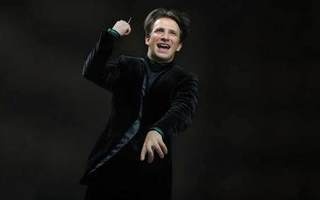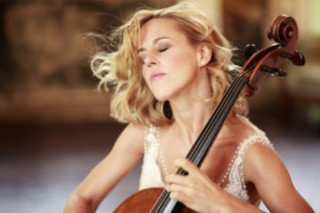|
Back
Classically Classy Classical Style New York
Avery Fisher Hall, Lincoln Center
08/04/2015 -
Wolfgang Amadeus Mozart: Le nozze di Figaro, K. 492: Overture
Josef Haydn: Cello Concerto in C Major, Hob. VIIb: 1
Ludwig van Beethoven: Symphony No. 4 in B Flat Major, opus 60
Sol Gabetta (Cello)
Mostly Mozart Festival Orchestra, Cornelius Meister (Conductor)

C. Meister (© Rose Frank)
If last night’s Mostly Mozart concert was not exactly your typical Pierre Boulez selection, the combination of Mozart, Haydn and Beethoven fit directly into the late Charles Rosen’s The Classical Style. Whether the full house came for “the familiar” (which it actually wasn’t) or to hear two performers new to New York (which this writer did), performers and music gave more than was expected.
The young Cornelius Meister is familiar throughout Europe as a conductor and piano accompanist, though never in New York. And he certainly debuted with a youthful animation in the opening Mozart Figaro Overture. Yes, he went for the big effects, muting his orchestra down for the titanic chords, but this hardly degraded the composer. Like the Mostly Mozart opening night Overture to The Impresario, this was counterpoint at its most pointed and transparent.

S. Gabetta (© Sony Records)
The following Haydn C Major Cello Concerto was “discovered” in Prague some 50 years ago, though was doubtless performed by one of Haydn’s cellists for his own orchestra. That Esterházy Orchestra was probably half the size of the already chamber-sized group we heard last night. But the salon of the Esterházy Palace is a fairly small (and indubitably resonant) one, so the orchestral dimensions weren’t that essential.
And not, certainly for Sol Gabetta. For the record, “Sol” is a feminine “Sun” (not Solomon), and again for the record, Ms. Gabetta was born in Cordova, Argentina from French-Russian parentage and now lives in Switzerland. Oh, and she plays a rare Italian Duadganini cello.
And she plays it not with the supposed elegance of a Classical concerto, but a zest, a power, and an enthusiasm which embodies Mr. Rosen’s joy of the same period. She started the opening movement with swing over the four notes in a C Major chord, one of the strongest chords one can get on the cello. And she continued with those four-string chords throughout the movement.
As to Haydn’s cadenza, this could be written in Pierre Boulez’ day with no problems. The music changed meters, harmonies and contrapuntal tricks fit only for the greatest cellists of the 21st century. And Ms. Gabetta seemed to have no problems at all.
More Haydn surprises in the second movement, for he allowed his orchestra to play the main parts, while Ms. Gabetta played the most soothing lines almost an ostinato. It was back to her virtuosity in the finale, where she took a single theme and spun it almost out of control, imitating herself on the to and bottom of the instrument. (One wonders whether Haydn wanted to have two solo cellos, but the orchestra probably had only the single soloist.)
These first two works could be called sparkling. But nothing was more bubbly than Beethoven’s Fourth Symphony. Even more than the Eighth or Second, the Fourth warbles on its merry way, with even the Adagio movement a lulling tale of love and romance. Yes, it had some Haydnesque jokes (the finale, with its fake endings), but this was Beethoven as his own master. He may have been deaf, but that only amplified his feelings of mastery.
Cornelius Meister started with a very grave introduction, the deception to the most vivace main portion. For that second movement, he had the benefits of solos by flute, clarinet, horn and even tympani. For the ending, he let the orchestra whirl around on an (not altogether crystalline) moto perpetuo. Physically, he dodged, ducked, flexed and gave his orchestra all the legerity to play at the top of their formidable form.
Harry Rolnick
|